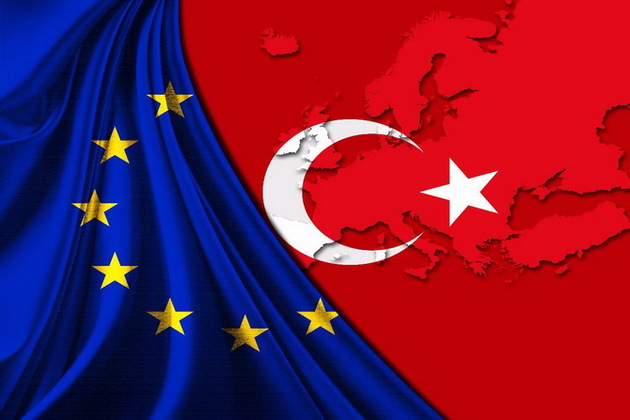When the European Union’s 27 foreign ministers gathered in Brussels last Monday for their regular summit, the activities of Turkey were high on the agenda, Gulf News reports in its article EU sanctions on Turkey can complicate matters. While President Recep Tayyip Erdogan’s decision to deploy Turkish military personnel across the Mediterranean Sea to Libya is a concern, more pressing for the 27 ministers is Turkey’s decision to continue drilling for oil and gas in European waters off the coast of Cyprus.
After Monday’s gathering, the EU’s top diplomat Jesep Norrell, confirmed that Brussels is preparing a list of Turkish names to be sanctioned over Ankara’s oil and gas exploration in the Eastern Mediterranean. “We are waiting for the working groups closely involving with the issue to complete the list of names to be imposed the necessary sanctions,” Borrell told reporters after the summit. “We know that some names are included in the list.”
As far as Brussels is concerned, Turkish exploration efforts are illegal and violate the sovereign rights of Cyprus in a dispute that has been simmering since last summer. For its part, Ankara says it’s entitled to drill in the area as it is a guarantor of the Turkish Republic of Northern Cyprus — the enclave on the north-east third of the island it created by its invasion there in the summer of 1974.
Access to energy sources
Turkish logic says that because Turkish North Cyprus is an internationally recognised state and the drilling is done with the rump state’s approval, it can’t be illegal. Logic is one thing, common sense another: Turkey is the only state that recognises North Cyprus.
The bigger picture for the European Union is one of gaining access to energy sources that are secure and within its own borders. Yes, the continent is moving towards a future based on renewable and sustainable energy, but there’s still a need for ‘hard’ fuel sources such as oil and gas.
Right now, much of the natural gas that keeps Germans warm and Austrians cosy comes from Russia — in pipelines that cross the geopolitical minefield of a divided Ukraine. It’s all very well for Gazprom to be a major sponsor of Europe’s football, another for it to be a major supplier of Europe’s energy.
The fuel that powers jets and engines is refined in Italy from Libyan supplies — light, sweet crude that east to distil into petroleum spirits. And surely those Libyan supplies would have nothing to do with Erdogan’s sudden interest and military intervention in strictly Arab affairs?
This entire dispute originated following the discovery by a US energy giant over the last five years of a huge gasfield off Cyprus’ south coast. Experts believe it contains 227 billion cubic metres of gas at sub-sea levels that are readily accessible in warm water conditions — and worth at least $45 billion (Dh165 billion). And where there’s gas, there’s most likely oil.
Good news for Europe
That’s good news for Europe, bad news in a volatile region where the interests of Turkey, Greece and the third-largest island in the Mediterranean converge.
When the Greek Cypriot side permitted international energy companies to extract the gas, they sent ships to explore the area. The Turkish side, meanwhile, felt betrayed by this move and dispatched navy ships. In February 2018, tensions escalated when a ship operated for an Italian energy company contracted by the Greek Cypriots was stopped by Turkish warships.
Last summer, Turkey sent two drilling ships to the area — an act considered by the European Union to be a violation of Cyprus’ sovereignty. It argues that the law of the sea entitles it to an exclusive economic zone extending 320 kilometres into the sea, allowing it to exploit any natural resources within this area. But the complicated political situation in Cyprus means this law is not easy to apply.
For months, Brussels has been putting pressure on Ankara to drop its exploration. That’s falling on Erdogan’s deaf ears, and last week he said the drilling efforts would be stepped up in the eastern Mediterranean after signing a maritime deal with the embattled government in Tripoli in November. That deal claimed large areas of Mediterranean Sea for Turkey — further infuriating all other nations bordering the sea there.
As far as Greece, Cyprus and Brussels are concerned, the international law of the sea, the principle of good neighbourly relations and the sovereignty and sovereign rights over the maritime zones of EU states have to be respected.
But there is one trump card in all of this that Erdogan holds and would most certainly play if push comes to shove with Brussels.
Right now, Turkey hosts more than 3.5 million refugees — more than any other country around the world. It has spent $40 billion so far during the crisis, and the EU has pledged to spend $6.5 billion helping the Erdogan government.
Even this is a point of contention: Ankara says the EU money comes late and isn’t enough; Brussels says Turkey isn’t sticking to its pledge to tighten its borders along refugee routes.
If the European Union were to sanction Turks in the coming weeks, those borders might become very porous indeed.






